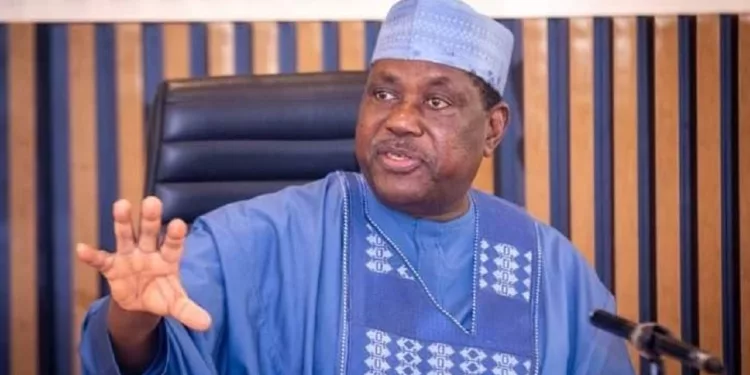The federal government has unveiled a new satellite pay television which it affirmed would serve as an alternative to existing ones and satisfy the yearning of Nigerians by giving them value for their money.
The secretary to the government of the federation (SGF), Sen. George Akume, made the declaration at the official launch of an indigenous Nigerian satellite television, Silver Lake Television (SLTV) in Abuja.
He noted that the establishment of the outfit is in line with the desire of Nigerians to “reap from the bountiful harvest awaiting investors in the Nigerian economy.”
He commended the management of Metrodigital Limited (owners of the firm) for what he said was their patriotic step in setting up the satellite television, saying: “It is becoming very clear that we are on the right path to our collective recovery and prosperity. This is our country; the only one we can truly call our own and we must fix it by ourselves.”
The SGF added: “In recent times, Nigerians have been yearning for alternatives to Satellite Pay Tv that can serve as an alternative to the existing ones. SLTV has responded very loud and clear and from the information made available to me, they are willing to give their fellow compatriots real value for their money in terms of service quality and affordability.
“It is gladdening that Metrodigital recognises the fact that the federal government has demonstrated an unwavering commitment through robust policies and legal frameworks to promote free competitive and responsible broadcasting service in Nigeria, devoid of any form of monopoly and unfair market practices in the broadcast industry in line with the determination of the administration of President Bola Ahmed Tinubu, to turn the Nigerian economy around.”
“Since his ascendancy as the president of Africa’s most populous nation, the President has made enormous policy changes in his quest for economic recovery, one of the results being the reason that we have gathered here today.”
“Nigeria is an opportunity that is impossible to replicate or find elsewhere in any part of the world. The federal government wishes to assure the Management of SLTV of her full backing as they continue to do legitimate business in the broadcast industry of Nigeria.”
In his remark, the managing director of Metrodigital Limited, Dr. Ifeanyi Okafor, lamented that the growth of pay TV in Nigeria had been hampered by policies and legal frameworks that encouraged monopoly.
He said his firm was, however, encouraged to invest because the government had started to take positive steps to address the issue.
“The pay TV industry in Nigeria has not actually witnessed a robust and accelerated growth since inception as witnessed in other places. The reason is as a result of the policies and legal frameworks that shape the practice and attitude of the industry participants.
This allowed the dominant players to introduce monopolistic practices that over the years prevented innovation, growth and led to poor quality of service delivery.
“It is however gratifying that in the last few years, the federal government of Nigeria took the bull by the horn and addressed some of these underlying problems,” Okafor stated.
Speaking to reporters at the ceremony, the director general and chief executive officer of the Nigerian Broadcasting Commission (NBC), Charles Ebuebu, disclosed that the commission would consider the call by Nigerian pay satellite television subscribers for the introduction of pay-per-view options.
However, he said that he would be renegotiating the contracts already entered into by the content providers.
“Definitely, if it’s applicable, it will be considered. The issue is this, sometimes those discussions also need to start from when the content is acquired, because usually the traditional method of acquisition of content is that you licence per month or annually, based on a 30 window.
“So, if you’re going to have to do a pay-per-view, you have to go back and negotiate it. Definitely, we do acknowledge in some instances, in other jurisdictions, some of those models come under different names really applicable so we’re also looking into it as a regulator,” he said.
Ebuebu assured that the commission would look into the area of overpricing of content even as he affirmed that the general economic situation in the country affects all sectors of the economy.
The NBC DG/CEO explained: “There are two sides to that coin; the first part to it is that with the current economic situation of the country, inflation and all of that, it’s not just broadcasting that is affected, all businesses are affected, so when you have prices being reviewed upwards, it’s not located only within the broadcast sector.
“However, we do acknowledge the fact that in some cases there have been exploitation in certain areas and as the NBC, we’re looking at it, like I said, we’re reviewing our policies and regulations so as to create a viable competitive ecosystem in broadcasting where the consumers will be the ones who’ll have to choose and therefore, market forces determined prices and it’s not exploitative.”



